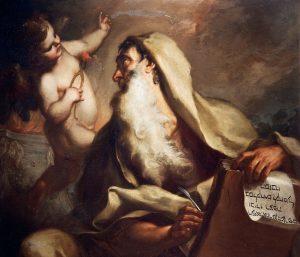Thoughts on Sunday’s Lessons for Nov. 29, 2020
First Reading: Isaiah 64:1-9
It is Advent now, the first season of the new church year, and our Gospel readings for the year turn from Matthew to Mark. Our Hebrew Bible readings this year will take us through an anthology of Israel’s ancestral legends and its earthly kings.

Profeta Isaia (Prophet Isaiah), 18th Century painting by Antonio Balestra (1666-1740). Castelvecchio Museum, Verona, Italy. (Click image to enlarge.)
Sunday’s readings sound a consistent Advent theme: God is coming. God may come quietly and quickly; God may come with fire and upheaval. We must be ready. In our first reading from Isaiah, the people are returning home to Jerusalem from exile at last. They must face up to harsh reality: This is not the city they knew, but a devastated landscape with a destroyed Temple and a remnant of defeated people. Oh, God, the prophet cries, come down! Show your might, restore your people. Make us new, and forgive our sins.
Psalm: Psalm 80:1-7, 16-18
The Psalm, too, calls on God to hear the people’s prayers, set aside God’s anger, and restore Israel. The people have suffered. God’s punishment has forced them to endure their enemies’ derision and laughter. They have eaten and drunk their tears like bread and water. Please, God, the Psalmist pleads: Shine the light of your countenance upon us, save us, and we will never turn from you again.
Second Reading: 1 Corinthians 1:3-9
Paul’s first letter to the people of Corinth, a busy Greek seaport city, is a deeply pastoral epistle that will address serious fractures in a small but passionate Christian community. Paul begins with no hint of conflict, addressing the people in the formal style of ancient Greek correspondence. He sets the scene by greeting the community with grace and peace. He reminds them that grace has come to them through Jesus and enriched them, filling them with spiritual gifts. Because of this, Paul assures them, they will be ready, strong and blameless when Christ returns.
Gospel: Mark 13:24-37
The Prophet Isaiah spoke of his hope for God to come and bring justice after the first destruction of Jerusalem. Now we hear a similar call from the evangelist Mark soon after the Romans have destroyed the city and the temple again. As Mark anticipates Jesus’ return in power and glory, it is no wonder that he uses apocalyptic language. Mark imagines Jesus speaking of the signs and portents that will accompany his return: In three quick images, Jesus warns of a tumultuous time; advises his followers to watch for signs of his return; and urges them to be on the watch. Be ready, be awake, be alert, he warns, for we do not know the time or the hour.
